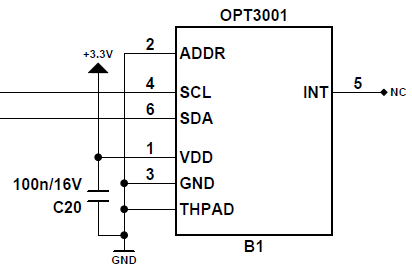Other Parts Discussed in Thread: ADS1115,
Hi, I noticed my device always returns read back data with the MSB = 0, whether it's the config, conversion data, or threshold registers. My bus clock is 400kHz.
I first noticed this problem when I was reading from a bright light source and noticed the reported lux dropped off for exponent values > 7. For a simple test, I power the device on, write A5B6h to Low Limit register 02h, and then I do a read and get 25B6h. The device shares the bus with an ADS1115 and that works fine; the read back data from the threshold and config registers always matches the data written and the conversion data is always correct. I am using the same clock rate for all devices on the bus.
Everything described above has been verified with an oscilloscope.






